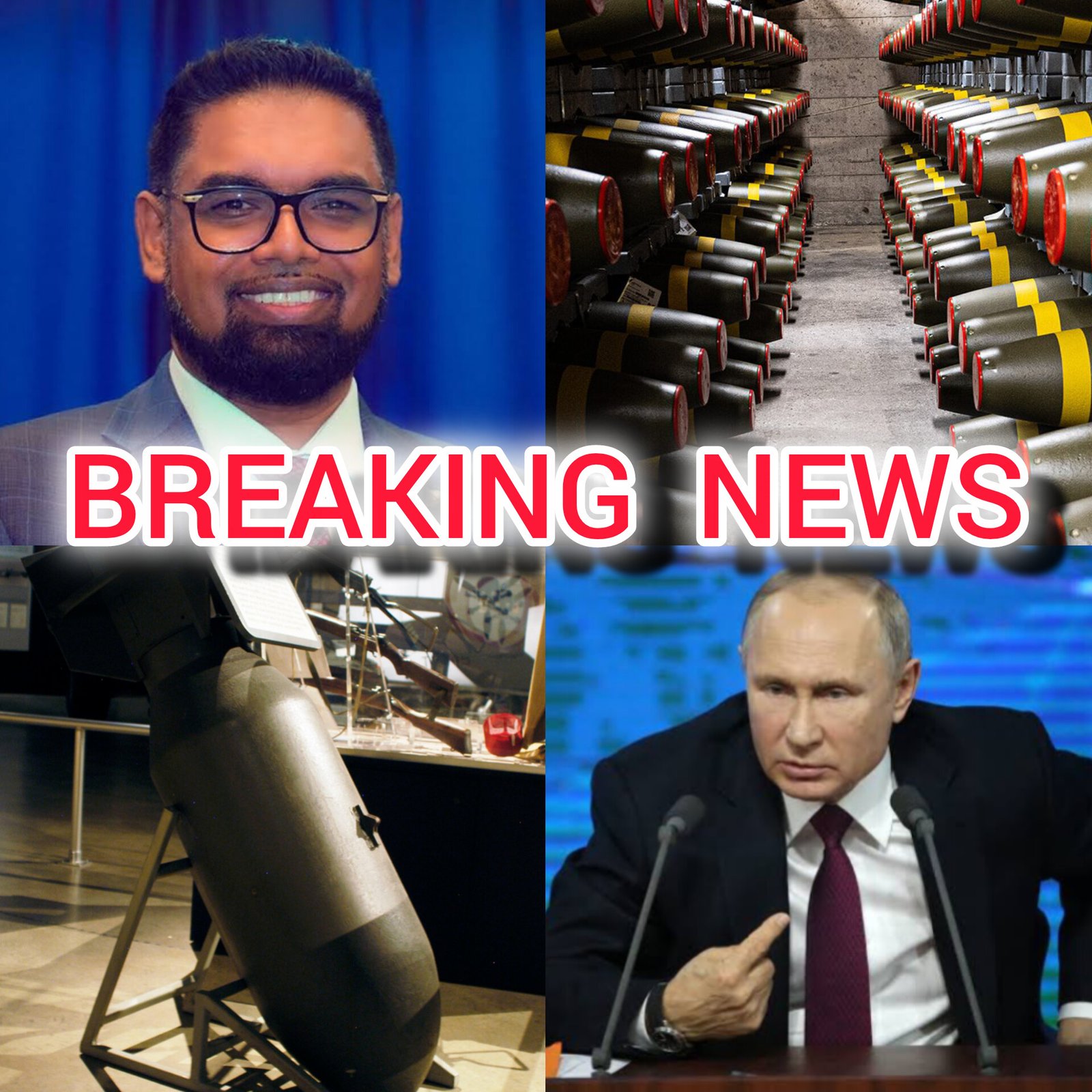Guyana
Shockwaves Across South America: Putin Threatens to Bomb Guyana Amid Mounting Global Tensions and Resource Dispute**Read More***

GEORGETOWN, Guyana — In a chilling and unprecedented escalation, Russian President Vladimir Putin has publicly threatened to bomb Guyana, plunging the South American nation into alarm and triggering international condemnation. The threat comes amid heated geopolitical maneuvering over Guyana’s burgeoning oil wealth and strategic position in the region.
A Dire Warning from Moscow
At a televised address from the Kremlin late Wednesday evening, President Putin warned that Russia would not hesitate to use military force against Guyana if it “continues to align itself with hostile powers and jeopardizes our strategic interests.” In dramatic rhetoric, he spoke of “targeting critical infrastructure” and “sending a message” — language that analysts say is calculated to terrify and intimidate.
While Russia has not formally named the precise targets, officials in Moscow implied that energy installations, communication hubs, and ports could be at risk. The message was clear: Guyana’s deepening ties with Western-aligned states and foreign investment from rival powers will not be tolerated.
Guyana in Shock, Government on Edge
In Georgetown, government offices and military headquarters went into high alert. President Irfaan Ali held an emergency cabinet meeting, pledging that Guyana would “defend its sovereignty at all costs.” The Guyanese Ministry of Foreign Affairs released a statement condemning Putin’s threat as “an act of aggression in violation of international law.”
Foreign Minister Hugh Todd declared that Guyana would seek recourse through diplomatic channels, including the United Nations and the Organization of American States (OAS). “We call on the global community to stand with us against this flagrant attempt at coercion,” he said.
Though Guyana lacks the military might to confront Russia head-on, its defense and security forces were reportedly scrambled to bolster coastal radar stations, refine early warning systems, and coordinate with regional and international allies.
Strategic Stakes: Oil, Influence, and Sovereignty
Observers believe Putin’s threat may be less about Guyana per se and more about the broader battle over influence in Latin America and control of oil supply chains. In recent years, Guyana has emerged as a rising oil-producing nation, with billions in offshore reserves attracting global corporations and investment.
Russia, seeking to counterbalance Western influence, has grown increasingly assertive in deploying its military and diplomatic reach to emerging power centers. Some analysts view the threat as part of a broader strategy to challenge U.S. and European dominance in the Western Hemisphere.
In backing up rhetoric with presence, Russia has previously deployed military assets to allied nations in the region — for example, when Russian bombers landed in Venezuela in coordination with Caracas. That move was viewed with alarm in neighboring Guyana, given a long-running territorial dispute with Venezuela over the Essequibo region.
International Outcry
News of the bomb threat ignited a wave of international condemnation. The United Nations Secretary‑General called the statement “reckless and deplorable,” urging immediate de-escalation and restraint. The OAS convened an emergency session, with many member states declaring solidarity with Guyana and pledging diplomatic support.
In the Caribbean, the Caribbean Community (CARICOM) expressed outrage and pledged to stand united. “Any threat to one member is a threat to all,” said a CARICOM communique, affirming the bloc’s backing for Guyana.
Major world powers weighed in. The United States and European Union issued coordinated statements condemning Vladimir Putin’s remarks and warning Russia of sanctions or other consequences should the threat be carried out.
Unlikely but Dangerous: Assessing the Threat
Many defense analysts caution that while the bomb threat carries alarm, the practical likelihood of Russia launching a full-scale aerial assault on Guyana is extremely low — not only because of enormous logistical challenges but also because the move would risk a global confrontation. Russia would have to fly through contested airspace or rely on allied bases in Latin America, all while provoking massive backlash.
Still, experts stress that even a limited strike — for example, against a single energy platform or coastal facility — would be catastrophic for Guyana and set a dangerous precedent. The psychological effect and diplomatic fallout alone could be profound.
Some analysts interpret the threat as coercive signaling: a way to force Guyana to reconsider alliances or deter outside actors from investing too heavily in its oil infrastructure. Others warn it may be part of a broader pattern of “strategic intimidation” used by Russia in global flashpoints.
Guyana’s Path Forward: Resilience and Diplomacy
Facing the threat, Guyana has limited but vital levers: rallying international support, mobilizing regional partnerships, and pursuing legal recourse through bodies such as the International Court of Justice. President Ali’s government is reportedly opening back-channel talks with Brazil, Suriname, and other neighbors to coordinate a joint response.
Domestically, the government is bracing for public anxiety. Emergency preparedness drills have been initiated in coastal cities, and communities near key infrastructure have been placed on alert.
As night falls over Georgetown, the streets carry a tense calm — citizens listen to the news, uncertain of what comes next. But the message from their leaders is firm: Guyana will not be cowed. The world is watching.

-

 Alabama crimson3 months ago
Alabama crimson3 months agoControversy Erupts: Four Referees Suspended After Alabama–Vanderbilt Game Amid Officiating Scandal…Read More…
-

 West Virginia7 days ago
West Virginia7 days ago**NO.1 Player Commits To West Virginia Football**
-

 Edmonton Oilers5 months ago
Edmonton Oilers5 months agoConnor McDavid and Wife Lauren Kyle Welcome Twins and Reveal Their Names – Fans Excited About the Growing McDavid Family!….Read More….
-

 Imagine Dragon 🐉2 months ago
Imagine Dragon 🐉2 months ago**Imagine Dragons and Crew Set to Embark on Exciting World Tour: Dates Revealed**
-

 Kentucky Wildcat1 month ago
Kentucky Wildcat1 month ago**Nation’s Top-Ranked Player Commits to Kentucky Basketball**
-

 Arkansas Razorbacks1 month ago
Arkansas Razorbacks1 month ago**Nation’s Top-Ranked Player Commits to Arkansas Razorbacks Basketball**
-

 Arkansas Razorbacks4 months ago
Arkansas Razorbacks4 months agoBack in Charge: Arkansas Razorbacks Officially Hire Bobby Petrino as Head Coach, Marking a Dramatic Return and a Bold New Era for the Program….Read More……
-

 BYU Football2 months ago
BYU Football2 months ago**Nation’s Top-Ranked Player Commits to BYU Football**